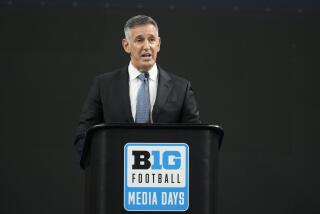Better Think Again, BCS
FORT LAUDERDALE, Fla. — Tuesday night’s Orange Bowl game between USC and Oklahoma will determine this year’s bowl championship series national champion.
After that, the focus will shift to the most important off-season game in years: the Capital Back to Square One Bowl.
In case you missed it, the BCS is in a BC-Mess and, incredibly, no one is sure what to do about it.
“I would not describe it as a crisis,” BCS coordinator Kevin Weiberg said of the state of his sport. “It’s not a crisis. But obviously we’ll have a busy off-season.”
After the most contentious year in the seven-year history of the BCS, the architects of college football have to figure out a new way to choose its champions.
The BCS standings, tweaked and twisted annually since their inception, may be done away with entirely and replaced by a selection committee.
Or not.
The Associated Press last week announced it would no longer allow its poll to be used in the BCS process, so now what?
The BCS was formed in 1998 to pair the top two teams in a sport that does not have a playoff.
It limped along almost amusingly the first few years, producing a series of confounding results, but nothing that couldn’t be rationalized or laughed off.
The last two years, though, the BCS became something quite different.
USC finished the 2003 season first in the AP and coaches’ polls but ended up third in the BCS standings, a formula that incorporates subjective polls and computers to determine a points champion.
The voting coaches were contractually bound to declare the Sugar Bowl winner as the national champion. Too bad the coaches’ No. 1 team, USC, was playing in the Rose Bowl.
This season, three equally qualified teams finished undefeated -- USC, Oklahoma and Auburn -- leaving Auburn as the odd team out.
Meanwhile, a tweak in this year’s formula that gave more power to the coaches and sportswriters produced an unmitigated disaster involving Texas, California and big money. The coaches got caught in an ethical crossfire fight because they refused to make their votes public, while writers faced journalistic questions about their making the news instead of reporting it.
And that ended the BCS as we know it.
“You can live with controversy,” said Keith Tribble, Orange Bowl executive director. “It’s the credibility. You will always have controversy.”
BCS leaders are resigned to the fact there is no way to fix their sport other than going to a playoff system; yet that idea remains opposed by most presidents and even some coaches.
College football has been built and nurtured on an intricate and multilayered bowl system -- there were 28 games this season -- and the belief that its regular-season games are more important than those of any other sport.
There are so many competing and conflicting ideas on what to do next it makes repairing the BCS seem comparable to the reconstruction of Humpty Dumpty.
Oklahoma Coach Bob Stoops, once a staunch playoff advocate, now opposes the concept.
“In basketball there is far less interest in the regular season than there is in the tournament,” Stoops said. “Everyone gets March Madness for the tournament. You don’t want everyone to get January madness for football and forget about everything else that’s happening in the regular season.
“I think basically we are in a playoff the last half of the year in the regular season.... People from coast to coast are watching each other because if anyone slips, you’re going to be out ... “
Fans thinking this year’s controversy might trigger a serious playoff movement are going to be disappointed. The BCS chaos, in fact, may produce a backlash in which the presidents ultimately decide to go back to the old system of bowl bartering.
“If you took a vote of many presidents in our conference, they might vote to go back to the Rose Bowl and forget the BCS,” Pacific 10 Commissioner Tom Hansen said.
Oregon President David Frohnmayer heartily endorsed the idea when reached by phone last week.
Asked about his conference returning to its traditional Pac-10/Big Ten arrangement in the Rose Bowl, Frohnmayer said, “We’re fine with that.”
Complicating these matters is the fact one more year remains on the old BCS contract and, only last month, the BCS signed a new four-year contract with Fox.
That deal was consummated before the five-alarm fire broke out over whether Texas or Cal deserved to go to the Rose Bowl.
So, it seems, the earliest the BCS could disband would be in 2010.
As for the immediate future, based on interviews with several college leaders, here are the options, ranking from least viable to most.
* Go to a full-blown playoff.
There are several credible ways to expand the system and produce a breathtaking, money-making, NCAA-basketball-tournament-like playoff that would not require many additional games.
You could seed the top eight teams and play Jan. 1 in the Rose, Sugar, Orange and Fiesta bowls and follow that with a semifinal and championship round.
Chances of being implemented?
Almost zero.
“I don’t hear one iota of movement on a playoff,” Big East Commissioner Michael Tranghese said.
Frohnmayer confirmed that sentiment, saying not even this year’s colossal controversy moved him on the subject.
“I haven’t sensed any groundswell to change our present position,” he said.
Bowl officials are weary of any plan in which they do not have some selection control over the schools that will be economically affecting their communities.
“After you get past No. 1 vs. No. 2, our concern is that you have people in the stands,” said Tribble, the Orange Bowl executive. “This is big business.”
* Reconsider the “plus-one” formula.
This is a truncated playoff and the one ABC pushed before pulling out of the new BCS deal.
How it works: Let the major bowls keep their traditional ties. Then, after the bowl games, match the top two teams in a national title game.
Given the controversy of the past month, this plan might now be acceptable to more college presidents.
Even Frohnmayer says he is not opposed to “plus-one.”
“That has appeal to a lot of people,” he said.
Many presidents, however, remain opposed to any team playing more than one bowl game.
The other hang-up is the new television contract with Fox. Under the terms of the new deal, starting in 2006, each of the four major bowls will play host to two games every four years.
In 2006, the Fiesta Bowl will be host of its own game and then, about a week later, the BCS championship game. The Rose Bowl will take its double-take turn in 2009.
This deal was reached in order to create two additional access berths for schools outside the six-conference BCS structure, who united and threatened legal action if the BCS did not become more inclusive.
So, while “plus-one” might now seem an attractive alternative, there are, as BCS coordinator Weiberg states, the “realities” of the new deal just signed.
* Continue the BCS system as it is and reconfigure a new standings formula without the Associated Press poll.
Many college football leaders are uncomfortable with any system that includes only the coaches’ poll and a computer component.
Weiberg called that plan “unworkable” in his mind.
Tranghese, the Big East Commissioner, said he is also opposed to using only the coaches’ poll in any new formula.
“I clearly don’t think you can put the coaches out there alone,” he said.
“The writers told me their job is to report the news, not create it. The coach’s job is to coach, not create the news.”
* Let a panel of experts determine the top teams.
This idea is the brainchild of Tranghese, former chairman of the NCAA basketball tournament selection committee.
Tranghese’s plan is to create a blue-ribbon panel of distinguished and respected football minds. There might be 15 members, one representing each of the 11 Division I-A conferences, plus one representative from the four major bowls.
This plan would take the coaches’ poll and the computers -- remember when they were deemed the BCS culprits? -- out of the equation.
Tribble of the Orange Bowl says he supports the idea, and Weiberg said it will be one of the plans discussed in the off-season.
Hansen of the Pac-10, however, says he does not think the committee plan is a good idea and that he would consider it only “as a last resort.”
Of course, you could still end up with controversy with a committee.
What if, this year, the panel voted, 8-7, to match Oklahoma versus USC and left undefeated Auburn out of the mix?
Then, the question becomes: Who cast the deciding vote and why? What are his personal biases?
* Go back to the old system.
Before the BCS was created in 1998, bowls worked their own deals with conferences and schools. It was capitalism at its purest, even if it often prevented No. 1 and No. 2 from meeting in a title game because the Rose Bowl had a contractual deal to match the Pac-10 versus the Big Ten.
The Rose Bowl agreed to join the BCS and release its host team to the national-title game if it was No. 1 or No. 2 in exchange for playing host to the title game every four years.
It is a deal that many Rose Bowl officials, in hindsight, would not have made.
If the BCS continues to erode over the next five years, going back in time might be the answer.
“I don’t know, maybe the presidents will say, ‘It’s not worth all this,’ ” Tribble said. “They know the old system worked.”
In the meantime, BCS officials must devise a short-term mechanism for picking next season’s BCS bowl participants.
Don’t expect anything dramatic or ground-breaking.
“Short term, I think we’ll continue to see a system not unlike you have now,” Weiberg said. “I think it remains a work in progress.”
More to Read
Go beyond the scoreboard
Get the latest on L.A.'s teams in the daily Sports Report newsletter.
You may occasionally receive promotional content from the Los Angeles Times.







